R. Kelly guilty verdict: YouTube finally acts to shut down his video channels
R. Kelly’s guilty verdict in a sex trafficking case has lead to YouTube making a major move.
Music
Don't miss out on the headlines from Music. Followed categories will be added to My News.
The music industry is singing the same old song in the wake of R. Kelly’s guilty verdict. Silence.
Until more than a week afterwards with YouTube shutting down RKellyTV (3.5 million subscribers) and RKellyVevo (1.6 million subscribers), citing a violation of its terms of service.
Attempts to watch videos on Wednesday displays a message that says, “This video is no longer available because the YouTube account associated with this video has been terminated.”
YouTube shut down his channels under its guidelines state which state if the creators are accused of egregious crimes, the platform can terminate their channels if the content is closely related to the crimes and the channel owners were convicted or pleaded guilty.
His songs are still available on their YouTube Music platform and user-generated content using his music can still be accessed on the main video channels.
But in the 24 hours after the fallen R & B star was found guilty of nine counts of racketeering and sex trafficking in a New York court last week, there was no public expression of support for his victims or commitment to clean up an industry dogged by allegations of sexual assault, harassment and discrimination from the music industry or social media which profit from Kelly’s work.
There was no response from those in power at labels or publishing companies, nor social media statement from any of the superstar artists whose names are next to his on hit records over the past 30 years including Jay-Z, Nas, Lady Gaga and Celine Dion.
And four years after the #MuteRKelly online campaign kicked off, his music remains easily accessible on Spotify and Apple Music; his artist biography was yet to be updated with the fact he is a convicted criminal awaiting a possible sentence of 10 years to life in prison.
“Robert Sylvester Kelly used his fame, his popularity and the network of people at his disposal to target, groom, and exploit girls, boys and young women for his sexual gratification,” Assistant US Attorney Elizabeth Geddes told the jury of seven men and four women in her closing argument last week.
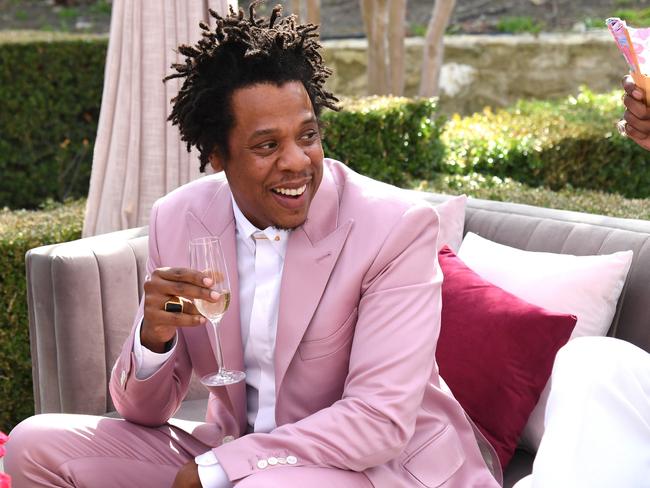
“He used lies, manipulation, threats, and physical abuse to dominate his victims.
“He used his money and his public persona to hide his crimes in plain sight.”
Kelly is the highest-profile music artist to be brought to account in the #MeToo era, after decades of abusing under-age black girls and young women
The heavy lifting to make sure R. Kelly doesn’t get paid while he is paying for decades of sex crimes has been left to the black women behind the #MuteRKelly campaign and those who have campaigned for him to be brought for justice.
American activists Kenyette Barnes and Oronike Odeleye began the #MuteRKelly movement in mid 2017 to pressure companies to financially divest themselves from the singer and focus attention on the multiple sexual abuse allegations against the singer.
“Our next strategy definitely is going after the streaming platforms again and the urban radio stations, because they hold culpability as well. There were urban radio stations playing R. Kelly’s music after that verdict. What the hell is wrong with you all?” Barnes wrote in Rolling Stone.
The MuteRKelly campaign initially trained the spotlight on the companies who had profited from the singer’s music, including his record label RCA – Sony Music in Australia – and publisher Universal.
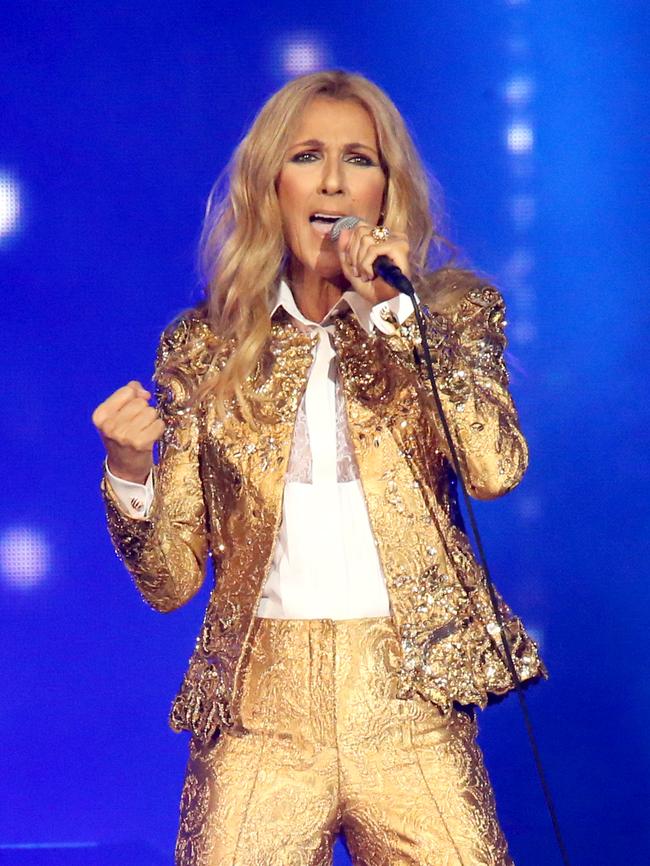
Both companies “quietly” dropped the singer from their rosters without public statement, with the Sony imprint RCA only acting in early 2019, two days after a #MuteRKelly protest outside their New York headquarters.
The industry and fans turned a blind eye to the constant allegations about Kelly’s sexual abuse from as far back as 1994, when he married 15-year-old R & B singer Aaliyah – he bribed a government official to falsify documents to claim she was 18 – when he was 27 and they were both global pop stars.
The #MuteRKelly campaign, including protests outside venues where he was due to perform, was effective in cancelling gigs including a Pre-Mother’s Day Love Jam at a Chicago university in 2018.
And women who had released music with him including Lady Gaga, Celine Dion and the Pussycat Dolls finally broke their silence about the allegations after the airing of the damning Surviving R. Kelly series in early 2019, which ultimately led to his prosecution.
Gaga, herself a victim of sexual assault, apologised for not supporting victims sooner and vowed to have the song Do What You Want removed it from streaming services. A new version featuring Christina Aguilera is now on Spotify.
Dion also endeavoured to remove the song I’m Your Angel from her artist platform from streaming but it remains accessible via Kelly’s own page, along with all his songs, which have generated more than one billion streams.
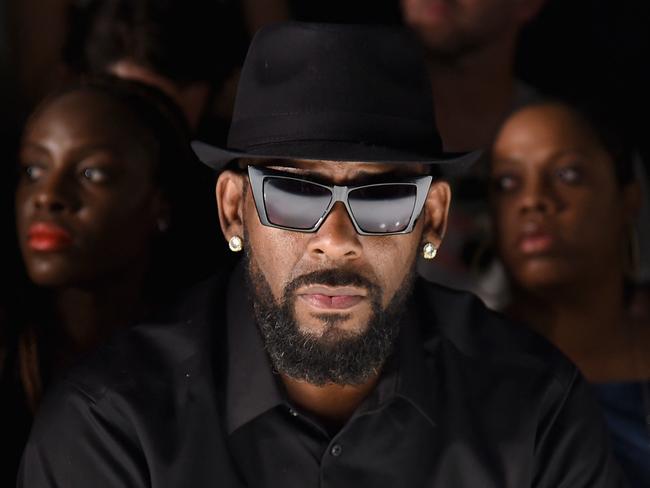
You could still buy Kelly’s music on iTunes this week, where his Grammy-winning 1995 hit I Believe I Can Fly, at $2.19 per download, re-entered the Australian top 200 after the verdict.
The day after he was found guilty, his Spotify artist page had 4,867,552 monthly listeners, a decline of roughly 330,000 from the 5.2 million monthly Spotify listeners he had in mid August when the trial began. It was back up over 4.9 million by Thursday.
“We still have a campaign against the streaming platforms because every time someone streams a R. Kelly song, that is money going into his pocket and we have to stop that. And it’s not censorship. It’s not ‘bringing down a Black man,’” Barnes said.
“This is accountability and sometimes accountability is ugly. This is what has to happen to ensure that not only will he no longer harm and malign; his enterprise will no longer harm and malign, and that it sends a message that behaviour is no longer acceptable. And if it happens, then you too can face the music just like he did.”
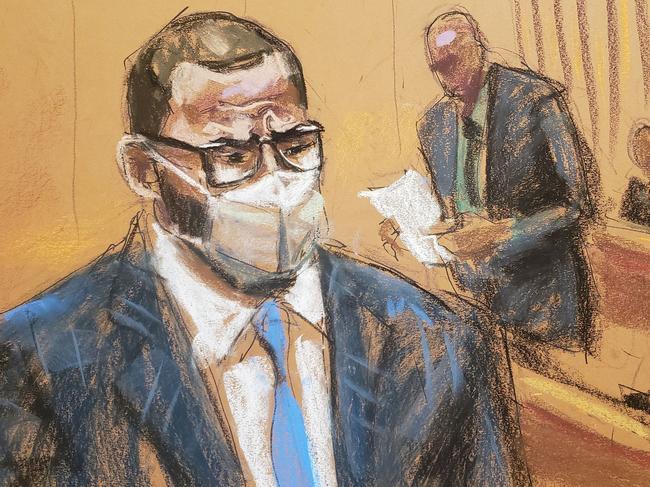
The censorship argument opens a can of worms for the global music industry and its partners, who have faced similar campaigns from fans and activists in the #MeToo era against artists accused of harassment, grooming or assault.
While Spotify removed Kelly from their curated playlists and two years ago introduced a “don’t play this artist” button so fans could block his music from their account, the streaming giant copped a backlash from fans and anti-censorship advocates who argued the industry would also have to wipe the music of problematic artists from murderer Phil Spector to Michael Jackson, Chris Brown to late rapper XXXTentacion (accused of strangling his pregnant partner).
The ethical dilemma remains that good music can be made by bad people, and ultimately cancelling those artists is up to those who consume or make money from it and how comfortable they are supporting a sexual predator.
At the very least, just as radio stations have to issue a language warning before airing songs with offensive language, record labels and streaming services should slap a banner on the artist pages alerting people to the artist’s conviction for sex crimes.
HOW IT ALL CAME UNDONE
R & B singer R. Kelly was the subject of persistent and harrowing allegations of kidnapping, sexual abuse and violence against under-age black girls and young women for more than two decades.
His victims, who had been threatened and silenced while his enablers in the music industry turned a blind eye, finally won justice this week.
Robert Sylvester Kelly, 54, was found guilty of nine federal charges of racketeering and sex trafficking in a New York and faces between 10 years and life in prison.
The wheels of justice picked up speed after the harrowing documentary series Surviving R. Kelly aired in early 2019 painstakingly made the case against him with first-hand accounts of victims, many of whom had never told their story before.
They shared how he would seek out teen girls at malls and drive by high schools, imprison them in hotel rooms and his homes, coerce them to perform sex acts on him in front of his friends, dictate how they dressed, what they ate, who they spoke to, and used his money, power and fame to silence them.
“People will say, ‘Well, why didn’t anyone notice?’ The answer is we all noticed. No one cared because we were Black girls,” one victim said.
Everyone did know.
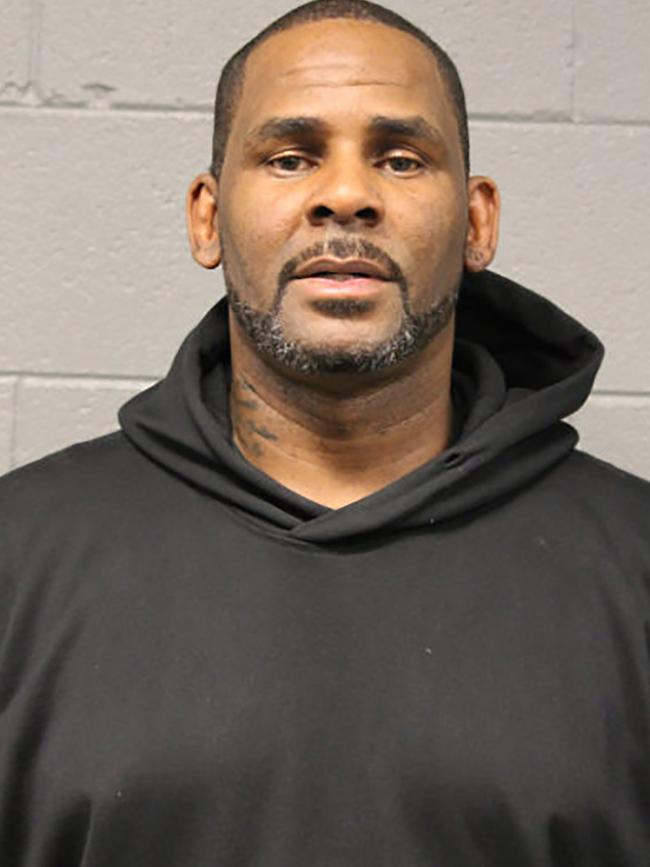
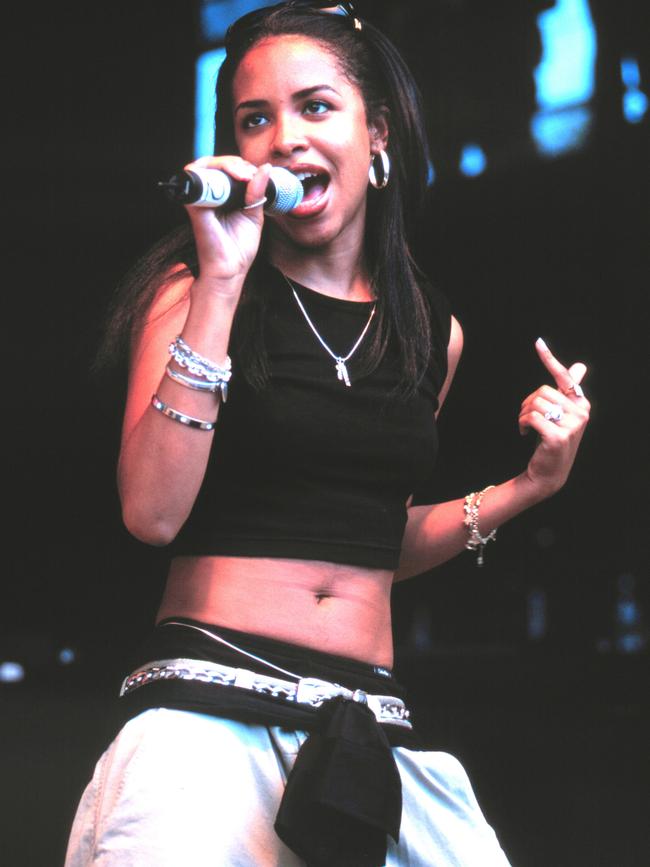
The public signs of Kelly’s depravity had been obvious since 1994.
That was the year Kelly, then 27, married 15-year-old rising R &B star Aaliyah.
He was the lead songwriter and producer on her debut album, Age Ain’t Nothing But a Number.
The marriage was annulled the following year after a magazine exposed that she had lied on the wedding certificate, stating her age as 18.
A former Kelly tour manager testified during his New York trial this month that the singer had bribed a government official to obtain a fake ID for Aaliyah, who died in a plane crash in 2001, so they could wed.
Tiffany Hawkins became the first young woman to publicly accuse the The I Believe I Can Fly chart-topper of sexual abuse in 1996. She was a 15-year-old aspiring singer and met him in her hometown of Chicago, jumping off the bus with a friend when they spotted him in a car nearby.
He invited her to his home and asked her to bring her friends, who were aged between 14 and 16. He would later encourage her to have group sex with him and his friends and other underage girls.
Hawkins sued him for $10 million in damages for emotional distress in 1996 but the matter was settled out of court for an undisclosed sum two years after it was filed.
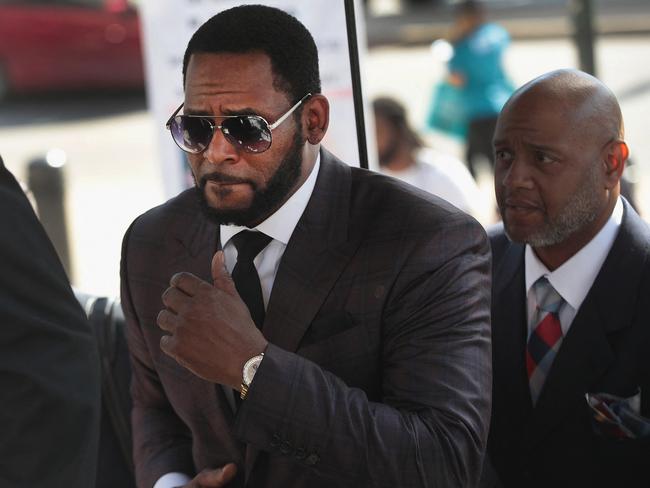
Kelly faced his next lawsuit alleging sexual harm in 2001 when Tracy Sampson, a former intern at Epic Records – a subsidiary of Sony – accused him of inducing her “into an indecent sexual relationship” when she was 17.
In an early 2019 interview as Surviving R. Kelly was being aired, Sampson said the R & B predator counted on young girls being unprepared for his exploitation.
She said he asked “‘Can I kiss you?’ and I was like, ‘No,’ to which he responded, ‘Well, give me a hug.’ And then, like, when I gave him a hug he just started kissing me,” she said.
“I was in love with him. I just didn’t know what to do. Like, I didn’t know if this was normal. I didn’t know if this is how adults acted.”
Two more cases were lodged in 2002. Chicago woman Patrice Jones alleged he made her pregnant when she was under-age and forced her to have an abortion.
Montina Woods, a dancer who toured with Kelly collaborators the Isley Brothers, claimed he secretly filmed them having sex and the footage was widely distributed as the R. Kelly Triple X sex tape.
He was indicted on child pornography charges in 2002 after another sex tape featuring Kelly with a minor was sent to the Chicago Sun Times who passed it onto police.
It took six years for the case to be brought to trial, with the singer acquitted of all charges in 2008 with the jury unable to conclude the girl on the tape was under-age.
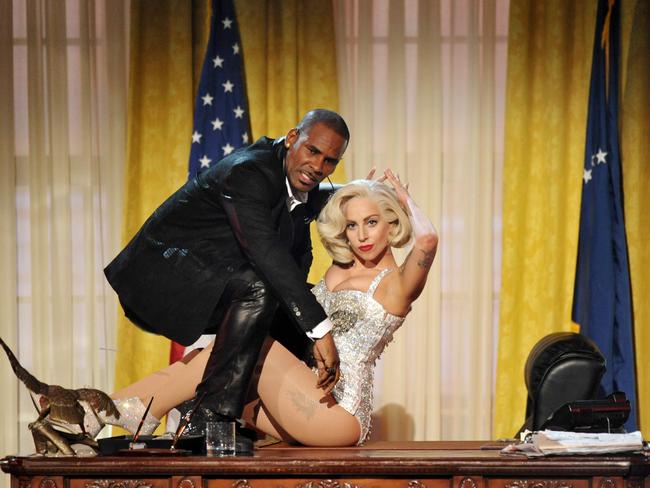
Chicago journalist Jim DeRogatis, who published his first report on allegations of Kelly having sex with underage girls in 2000, delivered the killer blow in 2017 with his Buzzfeed investigation of the singer’s “sex cult”.
The article alleged Kelly seduced young women who approached him to help their music careers and took control of their lives, dictating “what they eat, how they dress, when they bathe, when they sleep, and how they engage in sexual encounters that he records”.
According to the former employees and parents of several girls, he had confiscated their mobile phones to stop them contacting family and friends.
That report opened the floodgates, with victims breaking the nondisclosure agreements they were forced to sign, to speak publicly about their torturous experiences with the man who had continued to be embraced by fans and the industry throughout the decades of claims levelled against him.
The report was followed by the launch of the #MuteRKelly campaign which targeted his label RCA Records, publisher Universal, concert promoters, ticketing agencies and streaming platforms, demanding they cut him from their books and stop profiting from his music, all of it made as he faced one lawsuit after another.
“Only God can mute me. Am I supposed to go to jail or lose my career because of your opinion?” he sang with gross defiance on a song called I Admit he released on SoundCloud in 2018.
The comprehensive documentary series Surviving R. Kelly arrived in early 2019, forensically detailing the sexual abuse allegations against the singer via interviews with victims and their parents.
By February, he had been dropped by his label and by mid year, he was facing two separate federal indictments in New York and Chicago.
He was found guilty of all charges in the New York proceedings this week. He faces further court proceedings in Illinois – 10 counts of aggravated criminal sexual abuse – and in Minnesota, and has denied all charges.



